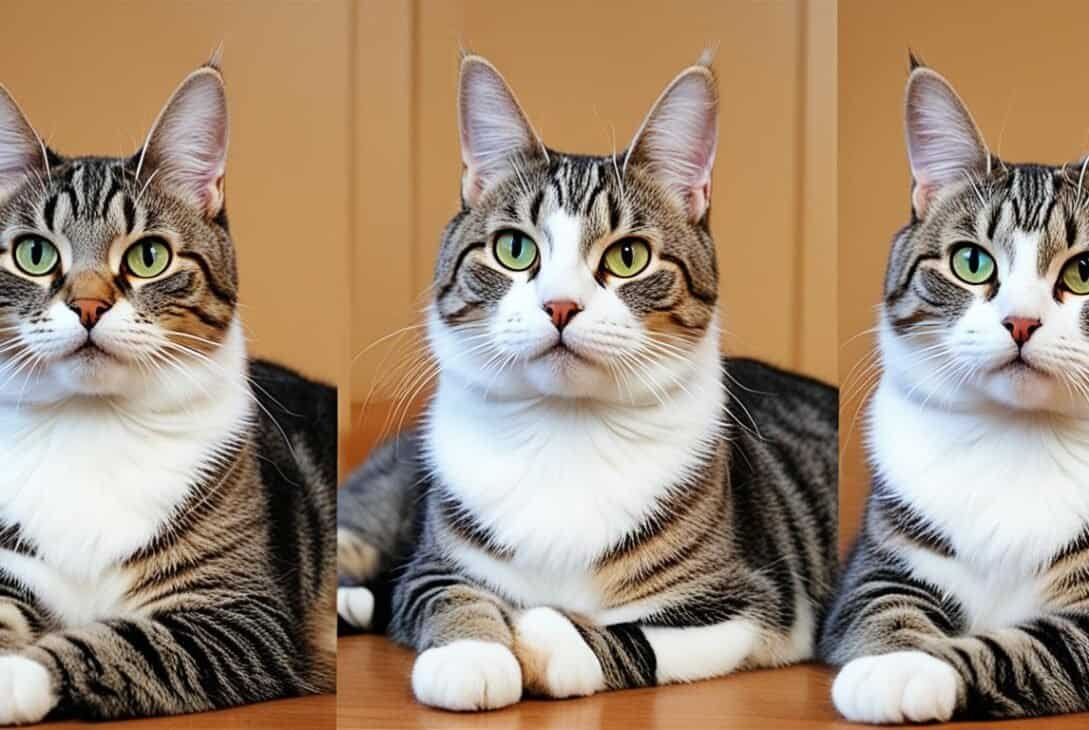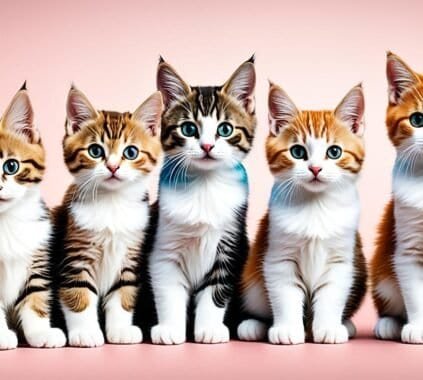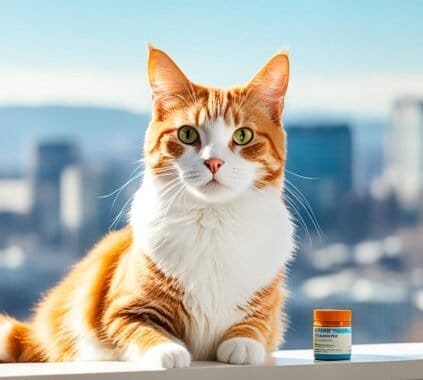A cat’s heat cycle, also known as an estrus cycle, is vital for breeding. Owners need to know how long and what signs indicate a cat is in heat. This helps in taking care of her and avoiding unexpected kittens. We’ll look into the cycle’s duration, average length, and key signs.
Key Takeaways:
- The average length of a cat’s heat cycle is about seven days, but it can range from one to three weeks.
- A cat’s first heat cycle usually occurs around six months of age.
- Signs of a cat in heat include increased affection, vocalization, and specific behavioral changes.
- Female cats can get pregnant at any stage of their heat cycle.
- Spaying female cats is highly recommended to prevent unwanted pregnancies and reduce the risk of reproductive health issues.
Cat Heat Cycle Stages and Behavior
The stages of a cat’s heat cycle are unique. The first stage is proestrus, where estrogen levels rise. You won’t see any signs of this stage. The next stage is estrus, the clearest part of the cycle. It can last from three to 14 days, usually about a week. 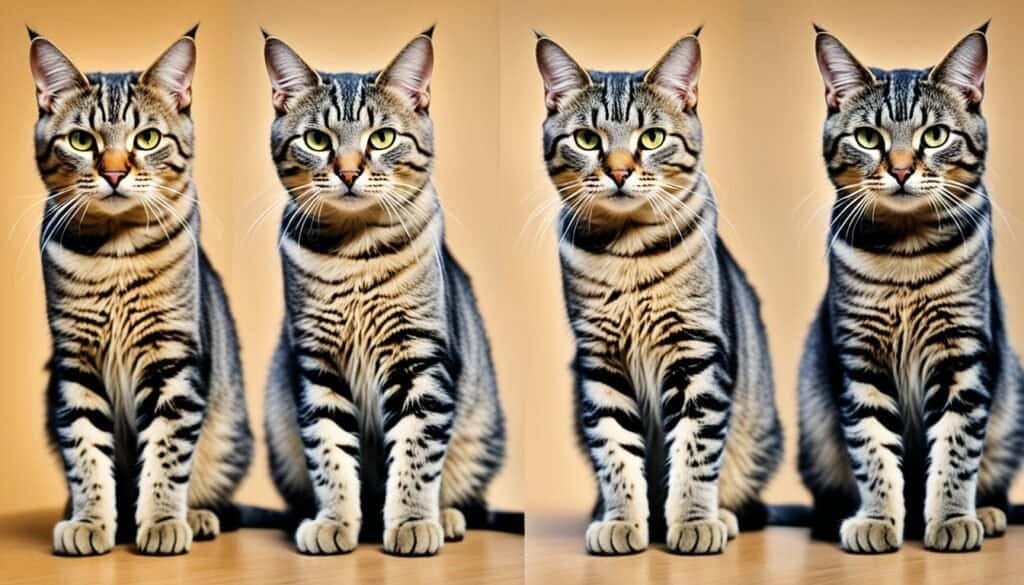 At this time, a female cat may seek more attention, make a lot of noise, and seem restless.
At this time, a female cat may seek more attention, make a lot of noise, and seem restless.
The third stage is called interestrus or metestrus. This is the break between estrus cycles. Cats need to mate for ovulation. If a cat mates, it pauses the cycle. Without mating, this lasts around 30 to 40 days. The final stage is anestrus, taking two to three months off from hormonal activity.
Cat Heat Cycle and Mating
To understand how cats mate and cycle through heat, know that cats can breed any time they are in heat. Cats are different because they need to mate to ovulate. This is unique among many animals. This process allows for fertilization and the chance for kittens.
Cats need several matings to ovulate during their heat cycle. This cycle can last for about a week, but it can vary. Generally, females need three to four matings in 24 hours to ovulate. The mating process is quite fast, often only lasting a couple of minutes. Female cats can mate with more than one male during this time. This can lead to a litter with kittens from different fathers. After ovulation, the cat quickly exits her heat cycle.
The number of heat cycles a cat has can change with seasons and daylight. Cats go through many cycles during the mating season, from early spring to early fall. The length of these cycles can differ. On average, a complete cycle ranges from one to six weeks, usually around three weeks.
The Importance of Spaying Female Cats
Spaying female cats stops unwanted heat cycles and pregnancies. This procedure is highly recommended before their first heat cycle. It prevents accidental breeding and tackles cat overpopulation. Cats can get pregnant as early as six months old. Spaying helps avoid pregnancies and lowers the risk of certain cancers.
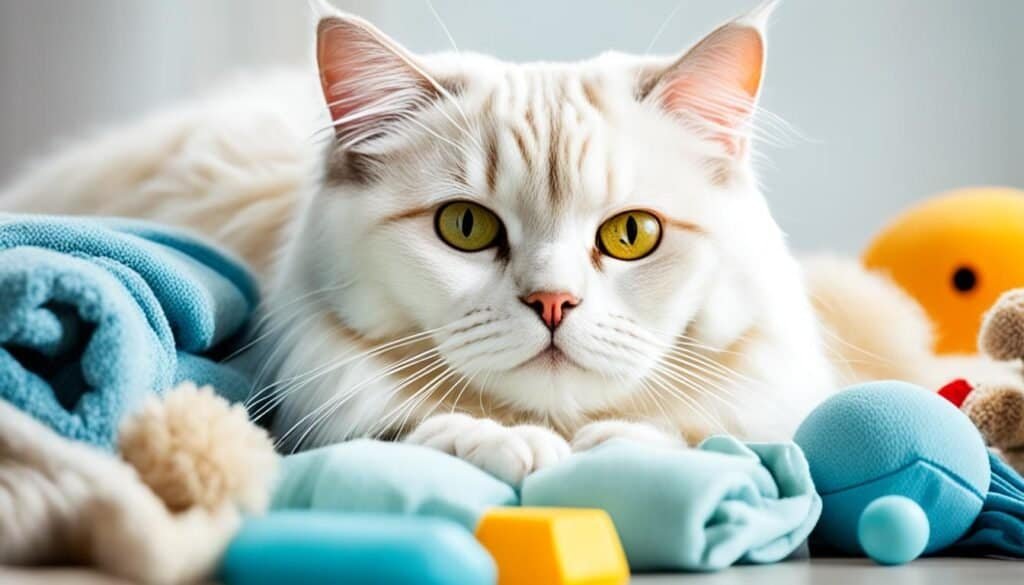
Spaying benefits both the cat’s health and helps control cat populations. It’s smart to spay a cat before her first heat to dodge mating risks. This straightforward procedure is done by vets. It stops heat cycles and boosts your cat’s health for a long time.
Choose the responsible route for your cat’s welfare and to stop needless breeding. Spaying is crucial for responsible pet ownership. It’s key to keeping your pet happy and healthy.
Conclusion
It’s important to know how long a cat’s heat cycle lasts and its signs. Female cats can begin their heat cycles as young as five months. They go through several cycles in one breeding season. A cat’s heat usually lasts about seven days but can vary between one to three weeks. Knowing a cat’s heat signs, like extra affection, more meowing, and other behavior changes, is key to good care.
It’s a good idea to spay female cats to avoid unneeded pregnancies. It also lowers health risks and helps manage the cat population. Spaying keeps cats from going through the hard parts of heat cycles. It also reduces the chances of some cancers. This keeps a cat’s reproductive system healthier.
To take care of a pet cat well, you should understand its heat cycle. Make sure they have a cozy place during their cycle. Watch for any unhappy signs, and think about spaying. Taking this step can help make female cats’ lives better and healthier. It’s all about looking after our cat friends’ reproductive health.
FAQ
At what age does a cat have its first heat cycle?
How long does a cat’s heat cycle usually last?
What are the signs of a cat in heat?
How long is the complete estrous cycle of a cat?
How often can cats go into heat?
When do cats go into heat?
How does mating affect a cat’s heat cycle?
How many matings do cats need for ovulation to occur?
Can a cat get pregnant at any stage of estrus?
Why is spaying female cats recommended?
When is the best time to spay a female cat?
Last modified: April 10, 2024

